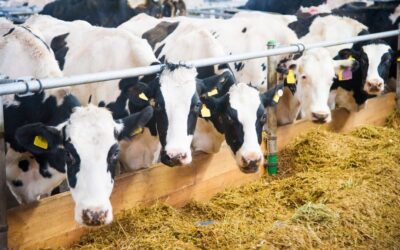As one of the U.S. food industry’s largest and most profitable sectors, the beef industry often faces significant criticism over its impact on the environment and animal welfare.
Driven by consumer demand and the growing importance of environmental, social, and governance (ESG) guidelines, the industry is turning the tables by taking steps to optimize sustainability practices.
Realizing the Real Opportunities for Livestock Producers
Advancements in beef production practices have Joe Kerns, President, Partners for Production Agriculture, exceptionally excited for livestock producers to capitalize on opportunities.

Joe Kerns, President, Partners for Production Agriculture
Based on the opportunities he sees in the beef marketplace, Joe emphasized key areas for livestock producers to watch:
Utilizing Resources for Efficient Livestock Production
When it comes to the changing face of animal production, Joe says we are moving back to a more agrarian society – food is raised where the feed is produced.
As a result, food production is becoming more efficient, requiring fewer miles driven and fewer resources allocated to get the beef to the market. Furthermore, the nutrients generated by production agriculture help fortify the land where the corn and soybeans are grown.
Gaining Efficiency in Beef Production with Genetics
By far, one of the most progressive movements in the beef industry today is the practice of capturing substantial control over cattle genetics. Through genetic analysis, dairy producers can breed premier animals for beef production. Beef on dairy is more ESG friendly as it provides a genetically improved calf that will yield more pounds of beef in a shorter time frame and with better feed efficiency.
Although it is a relatively new progression in the industry, Joe says genetic analysis will change the face of the dairy and beef industries. Livestock producers are finding dairy cattle provide an excellent host for improved beef genetics.
The livestock industry is refining beef production by going through a much more efficient process of producing beef via dairy females – a naturally efficient mother.
Mitigating Risk in Times of Change
Despite all the positive advancements in prioritizing ESG standards in beef production, every business opportunity carries some level of risk.
Joe believes that the availability of risk management tools and knowledgeable market support for livestock producers have never been better.
He emphasizes the importance of having a partner who understands the volatility of the financial markets and provides assistance to the production community.
Watch the Full Episode
Learn more from Joe Kerns and the potential market impacts and opportunities from ESG guidelines. The full DocTalk episode airs on RFD-TV on Monday, March 20, at 3:30 p.m. CST. The episode will be replayed Friday, March 25, at 5 a.m. CST and Saturday, March 26, at 6:30 a.m. CST.
Learn More about Ever.Ag’s Risk Management Services
This agency is an equal opportunity employer.
Futures Trading Disclaimer:
The trading of derivatives such as futures, options, and swaps may not be suitable for all investors. Derivatives trading involves substantial risk of loss, and you should fully understand those risks prior to trading. Any reference to past performance is not indicative of future results. All references to futures/options trading are made solely on behalf of Risk Assessment and Management.


